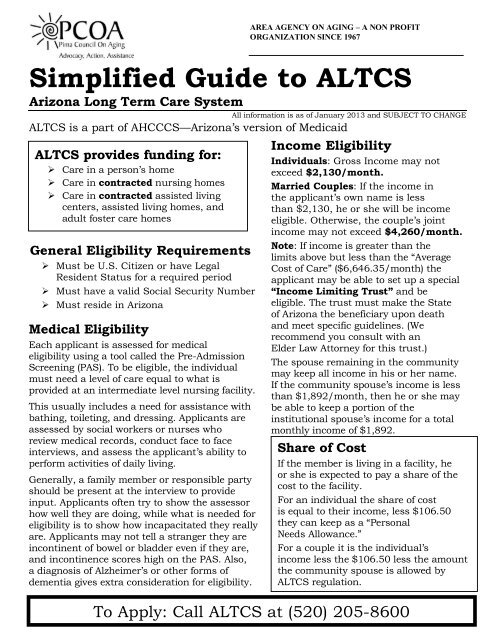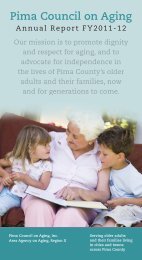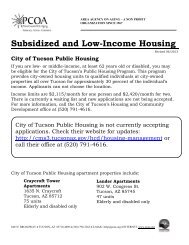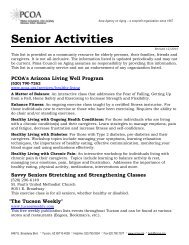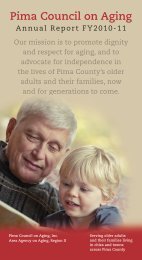PCOA's Simplified Guide to ALTCS - Pima Council On Aging
PCOA's Simplified Guide to ALTCS - Pima Council On Aging
PCOA's Simplified Guide to ALTCS - Pima Council On Aging
Create successful ePaper yourself
Turn your PDF publications into a flip-book with our unique Google optimized e-Paper software.
AREA AGENCY ON AGING – A NON PROFIT<br />
ORGANIZATION SINCE 1967<br />
<strong>Simplified</strong> <strong>Guide</strong> <strong>to</strong> <strong>ALTCS</strong><br />
Arizona Long Term Care System<br />
All information is as of January 2013 and SUBJECT TO CHANGE<br />
<strong>ALTCS</strong> is a part of AHCCCS—Arizona’s version of Medicaid<br />
<strong>ALTCS</strong> provides funding for:<br />
‣ Care in a person’s home<br />
‣ Care in contracted nursing homes<br />
‣ Care in contracted assisted living<br />
centers, assisted living homes, and<br />
adult foster care homes<br />
General Eligibility Requirements<br />
‣ Must be U.S. Citizen or have Legal<br />
Resident Status for a required period<br />
‣ Must have a valid Social Security Number<br />
‣ Must reside in Arizona<br />
Medical Eligibility<br />
Each applicant is assessed for medical<br />
eligibility using a <strong>to</strong>ol called the Pre-Admission<br />
Screening (PAS). To be eligible, the individual<br />
must need a level of care equal <strong>to</strong> what is<br />
provided at an intermediate level nursing facility.<br />
This usually includes a need for assistance with<br />
bathing, <strong>to</strong>ileting, and dressing. Applicants are<br />
assessed by social workers or nurses who<br />
review medical records, conduct face <strong>to</strong> face<br />
interviews, and assess the applicant’s ability <strong>to</strong><br />
perform activities of daily living.<br />
Generally, a family member or responsible party<br />
should be present at the interview <strong>to</strong> provide<br />
input. Applicants often try <strong>to</strong> show the assessor<br />
how well they are doing, while what is needed for<br />
eligibility is <strong>to</strong> show how incapacitated they really<br />
are. Applicants may not tell a stranger they are<br />
incontinent of bowel or bladder even if they are,<br />
and incontinence scores high on the PAS. Also,<br />
a diagnosis of Alzheimer’s or other forms of<br />
dementia gives extra consideration for eligibility.<br />
Income Eligibility<br />
Individuals: Gross Income may not<br />
exceed $2,130/month.<br />
Married Couples: If the income in<br />
the applicant’s own name is less<br />
than $2,130, he or she will be income<br />
eligible. Otherwise, the couple’s joint<br />
income may not exceed $4,260/month.<br />
Note: If income is greater than the<br />
limits above but less than the “Average<br />
Cost of Care” ($6,646.35/month) the<br />
applicant may be able <strong>to</strong> set up a special<br />
“Income Limiting Trust” and be<br />
eligible. The trust must make the State<br />
of Arizona the beneficiary upon death<br />
and meet specific guidelines. (We<br />
recommend you consult with an<br />
Elder Law At<strong>to</strong>rney for this trust.)<br />
The spouse remaining in the community<br />
may keep all income in his or her name.<br />
If the community spouse’s income is less<br />
than $1,892/month, then he or she may<br />
be able <strong>to</strong> keep a portion of the<br />
institutional spouse’s income for a <strong>to</strong>tal<br />
monthly income of $1,892.<br />
Share of Cost<br />
If the member is living in a facility, he<br />
or she is expected <strong>to</strong> pay a share of the<br />
cost <strong>to</strong> the facility.<br />
For an individual the share of cost<br />
is equal <strong>to</strong> their income, less $106.50<br />
they can keep as a “Personal<br />
Needs Allowance.”<br />
For a couple it is the individual’s<br />
income less the $106.50 less the amount<br />
the community spouse is allowed by<br />
<strong>ALTCS</strong> regulation.<br />
To Apply: Call <strong>ALTCS</strong> at (520) 205-8600
Resource (Asset) Eligibility<br />
The state includes all assets (including<br />
most trusts) except:<br />
‣ Equity value of home up <strong>to</strong><br />
$525,000 (Arizona residence<br />
with intent <strong>to</strong> return even if the<br />
intent is not realistic)<br />
‣ <strong>On</strong>e car (for use in getting<br />
<strong>to</strong> medical care)<br />
‣ Burial plots (for applicant or<br />
spouse or immediate family)<br />
‣ Burial funds limited <strong>to</strong> $1,500<br />
(simple separate account will do<br />
or ask the funeral home about an<br />
<strong>ALTCS</strong> qualifying plan).<br />
‣ Life insurance if <strong>to</strong>tal cash value of<br />
all redeemable policies is less<br />
than $1,500<br />
‣ Household goods, including<br />
jewelry, furniture, pets, <strong>to</strong>ols, etc.<br />
‣ Special needs trusts meeting<br />
<strong>ALTCS</strong> requirements<br />
For Individuals: Non-excluded resources<br />
may not exceed $2,000.<br />
For a Couple: If only one spouse needs<br />
care, the following rules apply:<br />
The spouse remaining in the community<br />
can keep all the exclusions listed for<br />
the individual plus the federally<br />
mandated allowance under “Spousal<br />
Impoverishment” guidelines. This<br />
means that if the couple’s countable<br />
resources are:<br />
‣ Less than $23,184, the community<br />
spouse may keep the <strong>to</strong>tal resource.<br />
‣ Over the $23,184, subject <strong>to</strong> a<br />
resource assessment.<br />
‣ Maximum Community Spouse<br />
Resource Deduction $115,920.<br />
(See AHCCCS Public Information<br />
Brochure “Community<br />
Spouse Overview.”)<br />
If both spouses require care, the joint<br />
non-excluded resources may not<br />
exceed $3,000.<br />
Transfer of Property for<br />
Less than Value<br />
WARNING<br />
If you give away or transfer<br />
funds or property for less than market<br />
value within 5 years (60 months) of<br />
applying for <strong>ALTCS</strong>, that transfer may<br />
make you ineligible. The penalty may<br />
be calculated at a rate of one month<br />
ineligibility for every $6,646.35 (the<br />
“Average Cost of Care”) that has been<br />
transferred. Federal laws have gotten<br />
more restrictive in the past few years<br />
and gifts or payments <strong>to</strong> families are<br />
carefully scrutinized.<br />
Estate Recovery<br />
In Arizona, the state may file a claim for<br />
reimbursement against the estate of an<br />
individual who received services through<br />
<strong>ALTCS</strong> for what the state calculates as the<br />
value of those services. This recovery is no<br />
longer limited <strong>to</strong> the Probate Estate of the<br />
recipient of services. Therefore, property<br />
that does not go through probate, such as<br />
property held in joint tenancy with right of<br />
survivorship, may be subject <strong>to</strong> recovery.<br />
Arizona will not seek <strong>to</strong> recover from an<br />
estate if there is: a surviving spouse,<br />
and/or a child under age 21, and/or a<br />
blind or <strong>to</strong>tally disabled child. (See “<strong>ALTCS</strong><br />
Long Term Care Medical Assistance Estate<br />
Recovery Program Brochure.”) As with all<br />
government regulations, Estate Recovery<br />
may change.<br />
For help: If you need help or assistance<br />
with understanding <strong>ALTCS</strong> or have been<br />
denied coverage you believe you are<br />
entitled <strong>to</strong> receive please call PCOA’s Help<br />
Line at (520) 790-7262.<br />
PCOA holds a class on <strong>ALTCS</strong> the 3rd<br />
Friday of each month at 2:00 P.M. at our<br />
office located at 8467 E. Broadway,<br />
Tucson, AZ. There is no cost <strong>to</strong> attend.<br />
For more information or <strong>to</strong> register,<br />
please call <strong>Pima</strong> <strong>Council</strong> on <strong>Aging</strong> at<br />
(520) 790-7262.<br />
To Apply: Call <strong>ALTCS</strong> at (520) 205-8600


